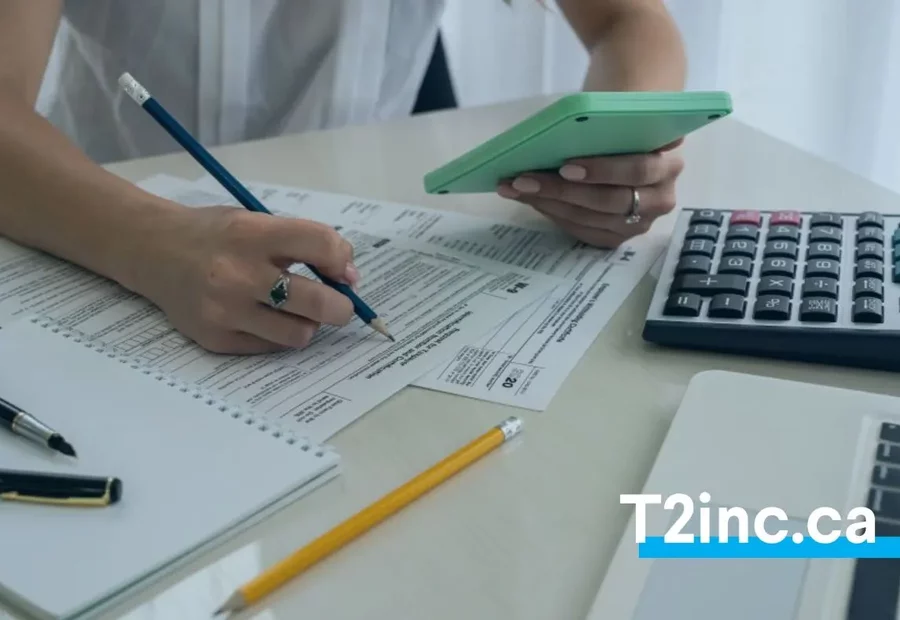How to File Your Business Tax Return Online in Canada

Preparing your annual filing can feel overwhelming. There are multiple forms to complete, rules that vary by province, and electronic submission is now mandatory for most corporations. Many business owners aren't always sure how to handle their tax obligations online or what they need to stay compliant.
The good news: the process becomes much easier once you understand the steps.
Whether you operate a small business, a new incorporated company or an established corporation, this guide walks you through your Canada business tax return, explains how to do your business tax return online and highlights the key rules to follow at the federal and provincial levels.
Corporate income tax returns in Canada
A business tax return is the annual report a corporation submits to the CRA (and Revenu Québec when required) to declare income, expenses, deductions and credits.
Any corporation that is resident in Canada must file a corporate income tax return every year. This rule applies even if the company made no profit, had very little activity, or was completely inactive during the year. Only a few exceptions apply, such as certain non-resident corporations or entities exempt under the Income Tax Act.
In short, your submission officially reports your annual financial results — income, expenses, losses, credits and deductions — so the Canada Revenue Agency (CRA) and, when applicable, Revenu Québec can assess your return correctly.
Who has to file a business tax return?
Before looking at the forms or the process, it's essential to understand who needs to submit a business tax filing in Canada.
Are you self-employed or operating a sole proprietorship?
If you are self-employed, do not submit a separate business tax return. Your business income is reported directly on your personal T1 return.
If this is your situation, you can review the differences between a sole proprietorship and an incorporated business to better understand your obligations.
Is your business incorporated (a corporation) and active?
Once incorporated, a company becomes a separate legal entity. It must submit its own annual return every year — even if revenue is low or no tax is payable. This requirement is set out in section 150(1) of the Income Tax Act.
You must also follow the provincial rules where your organization operates, whether you qualify for the small business rate or the general corporate rate.
Is this your corporation's first year?
New corporations often earn little or no income in their first year, but they must still submit a business tax filing covering that first fiscal period. Depending on the situation, extra documents may be required.
If you're preparing your first corporate tax return, make sure you understand the basics so you stay compliant from day one.
Is your corporation inactive or with no income?
A corporation can be inactive, but as long as it has not been formally dissolved, it still exists in the eyes of the CRA and Revenu Québec. It must therefore submit a return every year, even if the result is "zero."
If you want to avoid the common mistakes made by inactive companies, review our content on inactive corporation filing requirements.
When do you have to file your corporate tax return?
As a general rule, a corporation must submit its income tax filing within six months after the end of its fiscal year. This applies to:
- the federal return, required for all Canadian corporations;
- the provincial return, when a separate filing is required (e.g., in Quebec or Alberta).
The filing deadline is not the same as the payment due date. Most corporations must pay any balance owing within two or three months after year-end. Filing on time — but paying late — will still trigger interest charges.
To avoid problems, add your tax deadlines to your business calendar. A simple oversight can lead to late-submission penalties, daily interest or an adjusted notice of assessment. If you think you might already be late, review how interest and penalties apply to these filings.

Federal vs provincial: how does it work?
In Canada, most incorporated entities must complete the federal filing, and some must also submit a provincial one.
Federal return: required for all corporations
Every corporation operating in Canada must file a T2 Corporation Income Tax Return with the CRA. In many provinces, the T2 is also used as the basis for calculating provincial taxes.
If you want to learn more about the federal return, take a look at our full T2 guide to understand and complete the form.
Provincial return: required in Quebec and Alberta
In addition to the federal return that all corporations must submit, some provinces require a separate provincial corporate tax filing.
- Quebec: corporations with an establishment in the province must submit a CO-17 return with Revenu Québec, subject to specific exceptions provided for in the law.
- Alberta: corporations with a permanent establishment in Alberta must send an AT1 to Alberta Tax and Revenue Administration, unless they meet the exemption criteria laid out in provincial legislation.
If you operate in Quebec or carry on activities in the province, you can read our CO-17 guide to better understand your obligations.
Mandatory electronic filing of corporate tax returns in Canada
Electronic filing is now the default for corporate income tax returns.
For taxation years starting after December 31, 2023, most corporations must submit their T2 electronically. Exceptions exist for certain insurance corporations, non-resident entities, businesses reporting in a functional currency or those exempt under section 149 of the Income Tax Act. In Quebec, the CO-17 must also be transmitted online for years beginning on or after January 1, 2024.
If you mail a paper submission when electronic submission is required, you may face a specific administrative penalty (for example, a $1,000 federal charge). In some cases, the document may even be rejected, which is treated as if it had not been received at all.
How to file your corporate taxes online: 4 essential steps
Filing a business tax return becomes much clearer when you break the process into simple steps.
1. Gather your financial documents
Before preparing your filing, make sure you have all the documents you need, including:
- your financial statements (balance sheet and income statement);
- your bank statements and transaction history;
- sales records, expenses, invoices and supporting documents;
- information about directors and shareholders;
- documents related to loans, capital assets, inventory and payroll.
Having everything ready from the start helps you avoid errors and delays.
2. Prepare your accounting information
This step is essential. It includes:
- reviewing the bookkeeping for the year;
- posting year-end adjusting entries;
- making sure all transactions are properly categorized;
- checking that the figures are complete and consistent.
Whether you work with accounting software, an accounting technician or a CPA, accurate books are key to avoiding adjustments or reassessments.
3. Generate your corporate tax return
Once your accounting data is ready, you can generate your return using:
- CRA-certified tax software;
- the services of an accounting technician or CPA;
- or an online filing service such as T2inc.ca.
At this stage, you are generating the report based on your financial data, but you are not submitting it yet.
4. Submit your corporate tax return online
Once the return has been completed and reviewed:
- your T2 must be transmitted electronically with the CRA;
- and if your corporation has an establishment in Quebec, the CO-17 must be filed with Revenu Québec.
After sending everything, you will receive:
- an electronic confirmation of receipt;
- then a notice of assessment confirming the tax calculated or any adjustments made.
Can I file my corporate taxes myself? What are the risks?
Some business owners choose to prepare their own submission. This can work for simple structures and for people who manage their bookkeeping well. In reality, corporate taxation is technical. There are multiple forms, schedules, provincial rules, and specific calculations (CCA, credits, losses). Even small errors can have serious consequences.
The most common mistakes (and what can happen)
Here are the issues most often seen when business owners handle their filing themselves:
- forgetting a required schedule (e.g. schedules 100, 125 and 141);
- misclassifying an expense (which affects tax or CCA);
- missing a deduction or tax credit that is available;
- submitting or paying after the deadline;
- entering incorrect information on forms or schedules.
These errors can lead to:
- an adjusted notice of assessment;
- interest and penalties;
- the loss of certain credits or deductions;
- and, in some cases, a more in-depth audit.
When is it better to get professional help?
Even if your company is not very complex, it may still be helpful to get support. Many business owners work with a professional not because their structure is difficult, but because they lack time, feel unsure about the rules or want to avoid costly mistakes.
That support becomes even more important when your corporation:
- generates higher revenue;
- operates in more than one province;
- has employees;
- owns capital assets, inventory or investments;
- benefits from specific tax credits (e.g. SR&ED, investment credits);
- or has gone through a major change (new shareholder, merger, reorganization, etc.).
In these situations, a mistake can be expensive or lead to a complete review of your return.
Get online help from T2inc.ca for your corporate tax obligations
Preparing your annual filing means understanding your obligations, knowing your deadlines and following the right steps to prepare a compliant submission. Whether your corporation is new, active or inactive, what matters most is having complete financial information and sending it correctly to the authorities.
At T2inc.ca, we help hundreds of incorporated SMEs each year complete their business tax return smoothly and securely. Our team of CPAs, tax specialists and accounting technicians supports you at every stage. Need help to file your corporate income tax return online? Speak with our tax accountants or start your secure online submission in minutes.
The information in this article is general and does not replace personalized fiscal or accounting guidance. Every corporation's situation is different. Before making a decision or submitting your return, consult a CPA, tax specialist or qualified accounting technician who can review your specific circumstances.
- Corporate income tax returns in Canada
- Who has to file a business tax return?
- When do you have to file your corporate tax return?
- Federal vs provincial: how does it work?
- Mandatory electronic filing of corporate tax returns in Canada
- How to file your corporate taxes online: 4 essential steps
- Can I file my corporate taxes myself? What are the risks?
- Get online help from T2inc.ca for your corporate tax obligations
Contact our experts
Have a question? Need help? Fill out our online form to get help from our experts.
Contact usNeed more help?
Contact us by filling out our form
Are you interested in our services, but would like more information before taking the plunge? Contact us today and one of our tax accountants will be in touch to help you.
At T2inc.ca, we're committed to helping business owners manage their company's tax affairs so they can grow their business.




